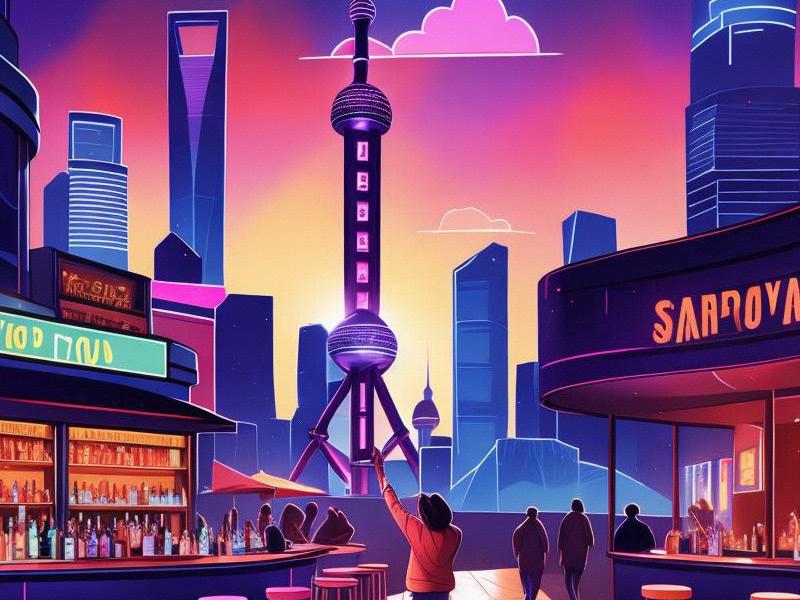
Shanghai, a global metropolis known for its blend of tradition and modernity, has long been a hub for cultural exchange and innovation. In recent years, the city's entertainment club scene has undergone a remarkable transformation, becoming a symbol of its dynamic nightlife and a reflection of the changing urban lifestyle.
The history of entertainment clubs in Shanghai dates back to the early 20th century, during the French Concession era. These clubs were often frequented by expatriates and the wealthy elite, serving as venues for jazz music, dancing, and socializing. The iconic Cercle Sportif Francais, established in 1926, was one of the most prominent clubs of that time, hosting legendary musicians like Louis Armstrong.
However, the golden age of Shanghai's entertainment clubs came to an abrupt end with the onset of World War II and the subsequent political upheavals. For decades, the city's nightlife was largely dormant, with only a few remnants of the past surviving.
The revival of Shanghai's entertainment club scene began in the late 1990s, coinciding with the city's rapid economic development and globalization. As Shanghai reemerged as a global financial center, the demand for sophisticated nightlife options grew, leading to the establishment of numerous high-end clubs.
Today, Shanghai boasts a diverse and vibrant entertainment club scene, catering to a wide range of tastes and preferences. These clubs are not just places to party; they are cultural hubs that host events, exhibitions, and performances, contributing to the city's artistic and cultural landscape.
爱上海同城419 One of the most notable trends in Shanghai's entertainment clubs is the emphasis on exclusivity and personalization. Many clubs offer private rooms, VIP services, and customized experiences, appealing to affluent clientele who seek a unique and intimate atmosphere. For instance, the M1NT Club, located in the prestigious Jin Mao Tower, is renowned for its opulent design and exclusive membership policy.
Another significant trend is the integration of technology and digital media into the club experience. Shanghai's clubs are at the forefront of adopting cutting-edge technologies such as virtual reality (VR), augmented reality (AR), and interactive LED displays. These innovations enhance the visual and auditory aspects of the clubbing experience, creating immersive environments that captivate patrons.
The music played in Shanghai's clubs also reflects the city's cosmopolitan character. While electronic dance music (EDM) remains the dominant genre, there is a growing appreciation for diverse musical styles, including hip-hop, house, and jazz. Many clubs host live music performances by both local and international artists, further enriching the cultural fabric of the city.
The impact of Shanghai's entertainment clubs extends beyond the nightlife scene. They play a crucial role in attracting tourists and boosting the local economy. According to a report by the Shanghai Tourism Administration, the city's nightlife attracts millions of visitors annually, contributing billions of yuan to the economy.
Moreover, the clubs serve as platforms for social interaction and networking. They provide opportunities for professionals, artists, and entrepreneurs to connect, collaborate, and exchange ideas. This has led to the emergence of a vibrant subculture centered around nightlife, with its own fashion trends, art movements, and social dynamics.
夜上海419论坛 Despite their success, Shanghai's entertainment clubs face several challenges. One of the primary concerns is the issue of noise pollution and its impact on nearby residents. The city government has implemented regulations to address this issue, requiring clubs to adhere to strict noise control measures.
Another challenge is the competition among clubs to attract patrons. With the market becoming increasingly saturated, clubs must不断创新(创新)(innovate) and differentiate themselves to stand out. This has led to a surge in creative marketing strategies, such as themed events, collaborations with知名品牌(知名品牌)(famous brands), and partnerships with influencers.
The future of Shanghai's entertainment club scene looks promising, with ongoing developments set to enhance the visitor experience. The city is home to several upcoming projects that promise to redefine the nightclub experience. For example, the upcoming opening of the Sky Park 97 in Lujiazui is expected to bring a new level of luxury and sophistication to the skyline.
Sky Park 97 will feature a rooftop bar and restaurant with panoramic views of the city, combining dining, drinking, and entertainment in one location. The project aims to crteeaa unique destination that appeals to both locals and tourists, further solidifying Shanghai's position as a global nightlife capital.
上海品茶论坛 In addition to Sky Park 97, other notable developments include the expansion of existing clubs and the introduction of new concepts. For instance, the rebranding of the iconic Shanghai Club into a multi-functional venue that combines nightlife with art exhibitions and cultural events is expected to attract a broader audience.
The growth of Shanghai's entertainment club scene is also being driven by the increasing popularity of nightlife tourism. As more people seek unique and memorable experiences, Shanghai's clubs are positioning themselves as must-visit destinations. This has led to a rise in nightlife tours and packages, offering visitors an insider's look at the city's vibrant nightlife.
However, the rapid growth of the industry has raised concerns about sustainability and the environmental impact of nightlife activities. Clubs are increasingly adopting eco-friendly practices, such as energy-efficient lighting, waste reduction initiatives, and water conservation measures. These efforts aim to minimize the ecological footprint of nightlife while maintaining the high standards of service and entertainment.
The cultural significance of Shanghai's entertainment clubs cannot be overstated. They serve as a microcosm of the city's dynamic and evolving identity, reflecting its history, diversity, and aspirations. The clubs are not just places to party; they are spaces where people come together to celebrate life, express creativity, and forge connections.
In conclusion, Shanghai's entertainment club scene is a testament to the city's resilience and adaptability. From its storied past to its dynamic present, the clubs have become an integral part of Shanghai's urban lifestyle, contributing to its cultural vibrancy and economic prosperity. As the city continues to grow and evolve, its entertainment clubs will undoubtedly play a pivotal role in shaping the future of nightlife, both locally and globally.
